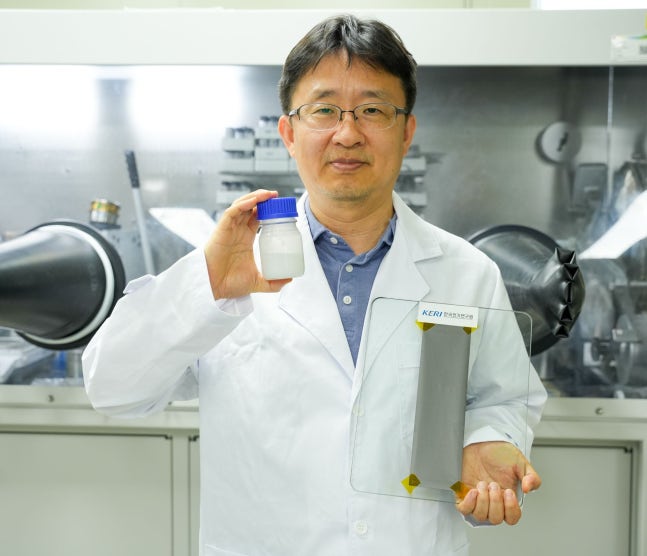Choi Jung-hee, Research Institute Director at the Korea Institute of Science and Technology
Maintains performance at 83.4% after 500 rapid charges
,
,

Choi Jung-hee, Research Institute Director at the Korea Institute of Science and Technology holding dispersed aluminum oxide solution (left) and lithium-ion battery electrode coated with it (right). The aluminum oxide coating technology helps maintain the lifespan of lithium-ion batteries at a level of 83.4% even after 500 rapid charges./Korea Institute of Science and Technology,
,

,
, ‘ Domestic researchers have developed a coating technology that can prevent the degradation of the lifespan of lithium-ion batteries even with repeated rapid charges. Rapid charging is a technology that enhances the convenience of electric vehicle drivers, but it has been known to cause a rapid decrease in battery lifespan and performance. It is expected that by resolving the limitations of rapid charging with a simple process, the pace of electric vehicle adoption can be accelerated.’,
,
, ‘Choi Jung-hee, the Director of the Electric Materials and Processes Research Center at the Korea Institute of Science and Technology, led a research team that announced the development of a technology that coats the surface of lithium-ion battery electrodes with aluminum oxide (Al₂O₃) to improve the battery’s lifespan and stability on the 27th. This research also involved professors Lee Jong-won of Hanyang University and Park Min-sik of Kyung Hee University.’,
,
, ‘The energy density of a battery is closely related to the driving range and charging speed of electric vehicles. However, to increase the energy density of lithium-ion batteries, the thickness of the electrodes needs to be increased, which can lead to a phenomenon called “thermal runaway” where the electrode structure becomes unstable as a result of repeated rapid charging. Thermal runaway is a major factor that shortens the lifespan of batteries.’,
,
, ‘To address this issue, the KIST research team coated 1 micrometer-sized aluminum oxide particles on the surface of the lithium-ion battery electrodes. While previous research attempted to improve the material composing the electrode to minimize thermal runaway, this research successfully presented a solution by simply coating the surface.’,
,
, ‘When rapidly charging a lithium-ion battery, crystals are formed on the surface of the electrode from lithium. These crystals, known as “dendrites” from their bump-like appearance, are considered a major cause of decreased stability and lifespan of batteries. However, it was found that coating the electrode surface with aluminum oxide increased the speed of lithium ion movement, reduced dendrite formation, and improved stability and lifespan of the battery.’,
,
, ‘The research team explained that the aluminum oxide coating can be used in processes that not only prevent dendrite formation but also increase the energy density of batteries. To enhance the performance and stability of batteries, functional materials must be used inside the electrodes. However, using multiple materials complicates the synthesis process, increases production costs, and thickens the electrodes, leading to decreased energy efficiency. By utilizing the newly developed coating technology, rapid charging efficiency can be improved without sacrificing efficiency.’,
,
, ‘Batteries coated with aluminum oxide were found to maintain 83.4% of their performance even after 500 repeated rapid charges. The effects have been confirmed in 500mAh pouch cells so far, and the research team plans to find ways to apply this to batteries with larger capacities in further studies.’,
,
, ‘Research Institute Director Choi said, “The convenient rapid charging and energy density of lithium-ion batteries in electric vehicles are considered conflicting factors hindering the mass adoption of electric vehicles,” and “Through our achievements, we can realize stable high-energy density lithium-ion batteries even with rapid charging, greatly contributing to the expansion of electric vehicles and the global achievement of carbon neutrality.”‘,
,
, ‘The research results were published in the international academic journal ‘Advanced Functional Materials’ on the 29th of last month.’,
,
, ‘Reference’,
,
, ‘Advanced Functional Materials, DOI: https://doi.org/10.1002/adfm.202400414’,
,
,

